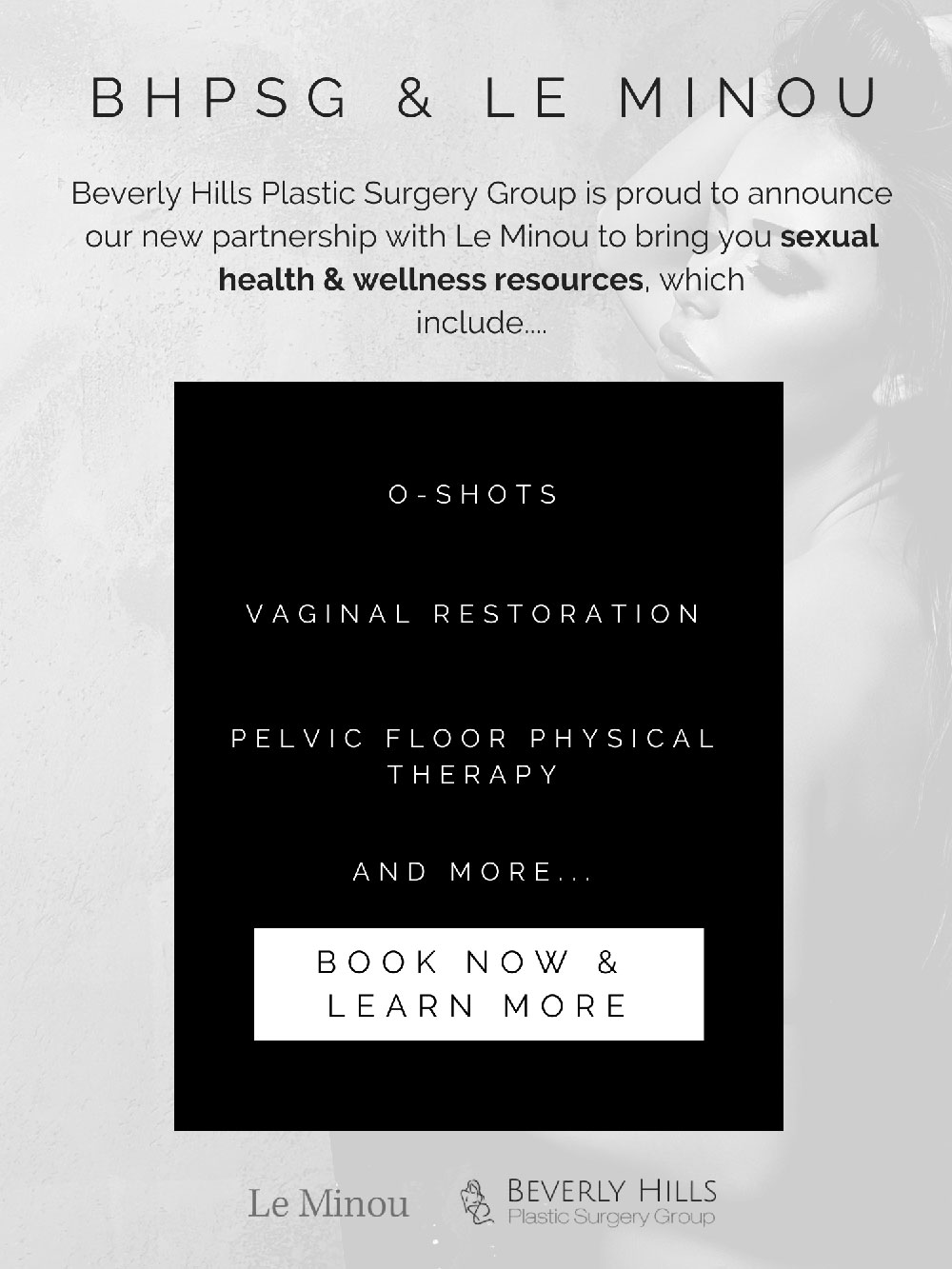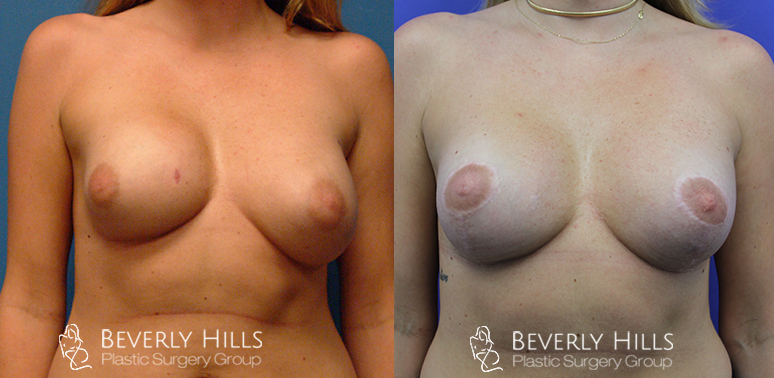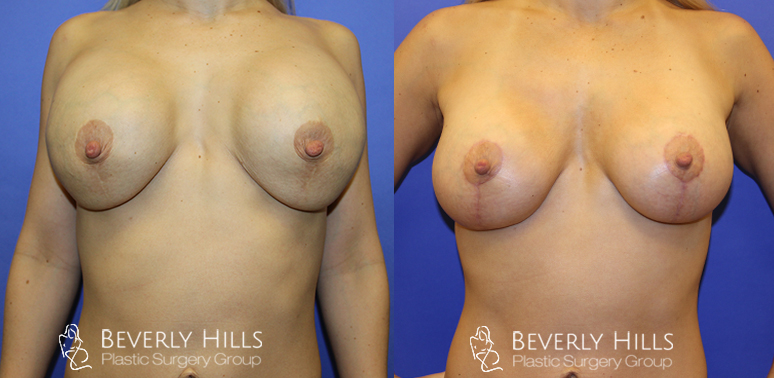
What is Capsular Contracture?
Capsular contracture describes the unfortunate event where scar tissue forms around the breasts and causes them to harden, making the breasts look and feel different. This can cause discomfort due to the tightening of the capsule as well as an unacceptable aesthetic appearance.
This is an unpredictable complication, but is common for patients who have undergone breast augmentation. While the causes are not well known, there are techniques that can help reduce the risk of capsular contracture in patients.
Major risks of developing capsular contracture are seroma (fluid accumulation in the cavity around implants), hematoma (internal bleeding in the cavity created for implant placement), and infection.
Symptoms of Capsular Contracture
-
- Rippling of the breast
- Hard, unnaturally shaped breasts
- Implant sitting higher than intended
- Tender and painful breast
In the case of minor rippling, you may only be able to feel it rather than see it. More severe rippling of the breast is a distinct sign of capsular contracture. Bands of scar tissue are compressing parts of the implant.
The best-known symptom of capsular contracture is hard, unnaturally shaped breasts. What once looked natural now appears round, almost like a baseball inside the breast. The implant may sit higher than before. This can be both painful and embarrassing.
During your capsular contracture examination, Dr. Danielpour and Dr. Layke will use the Baker Scale to analyze your condition. Each breast will be classified into one of four categories:
- Grade I – The breast is soft and appears natural in size and shape
- Grade II – The breast is a little firm, but appears normal
- Grade III – The breast is firm and appears abnormal
- Grade IV – The breast is hard, painful to the touch, and appears abnormal
Preventing Capsular Contracture
Reducing the risks associated with capsular contracture starts with the initial operation. Meticulous surgical handling of tissues and paying extra special attention to bleeding and fluid buildup during surgery can prevent the occurrence of capsular contracture. The body can also be rinsed with antiseptic multiple times before surgery to reduce bacteria in the area to be operated on. However, even with meticulous surgical care and antiseptic technique, there is still up to a 20 to 30 percent chance of capsular contracture and therefore proper treatment needs to be rendered.
As one of the top plastic surgery offices in Beverly Hills, Dr. Danielpour and Dr. Layke use advanced techniques and pay meticulous attention to detail. Using a gentle handling of tissues in a bloodless field, they minimize the chances of capsular contracture occurring. BHPSG’s Surgical Center is AAAHC certified which means that our facility is held to the same standards as hospitals.
Massage therapy is recommended 1-2 weeks after your breast procedure to ensure the area stays soft. This is a prophylactic measure, and not a treatment to correct capsular contracture. Our doctors and staff will train you in the proper technique to continue the massages at home.
If you are worried about capsular contracture after your breast augmentation, talk to Dr. Danielpour and Dr. Layke. They will answer any questions you may have. With their help, you will be better able avoid conditions that could cause this complication.*
Capsular Contracture Treatment
Capsular contracture usually does not soften on its own. The first step is identifying the problem by seeing a Board Certified Plastic Surgeon. The treatment of capsular contracture has evolved and is continuing to improve with more advanced technology and medications.
Capsular contracture treatment is reserved to Baker Grade 3 and 4 (see above) and usually starts with orally administered medicine that can sometimes soften the capsule. Usually, though, surgical intervention is needed.
Medical treatments are the first course of action. Drs. Danielpour and Layke prefer to conservatively treat patients prior to surgery. Using an evidence-based approach, they will begin capsular contracture treatment by prescribing a three-month course of Singulair in an attempt to soften the capsule. In a small percentage of patients, this successfully resolves the problem and no further intervention is required. If medication does not sufficiently soften the capsule, surgery is needed.
The most effective surgical treatment for capsular contracture is the removal of the implant, called a total capsulectomy. It is the most likely way to prevent the capsule from reforming. The implant and the capsule are removed together in a solid unit. This removes whatever contaminant may have caused the inflammation that triggered the issue. A new implant with an acellular dermal matrix, such as AlloDerm or AlloMax, is placed. This prevents scar formation around the implant and minimizes the chances of contamination. This series of treatments is shown to decrease recurrence rates to less than 1%, making it the most successful method to prevent capsular contracture from recurring.
In the past, open and closed capsulotomy were seen as alternative methods to treat capsular contracture. These methods are not effective and are not performed in our office.
Dr. Danielpour and Dr. Layke are on the forefront of breast revision surgery and operate on difficult capsular contractures and breast asymmetry cases regularly using the most advanced and up-to-date techniques, creating safe and long-lasting results.*
Capsulectomy Preparation
Since you will have already have undergone surgery for your breast augmentation, you should have a good idea of what to expect for treating capsular contracture. You will discuss the pros and cons of the procedure with Dr. Layke and Dr. Danielpour before you make your decision. Feel free to ask any questions you may have.
You will need to make arrangements for your recovery. Someone will need to help you get home and function for the first few days. You will need to request time off from work.
To prepare for capsular contracture surgery, you must stop smoking at least two weeks before the operation, and should not resume until at least two weeks after. It would be ideal if you could stop smoking altogether. If you need help, we can direct you to a program that can help you accomplish this.
If you are traveling from out of town, it is important to choose a hotel that can accommodate you during your recovery. You will not be able to fly home until you have recovered for a few days.
If you have any questions about how to prepare for your capsular contracture surgery, contact our office today by calling (310) 275-6600.
Recovery Process After Capsulectomy
It may take up to 48 hours for you to fully recover from the general anesthesia used during your operation. You will need someone to help you get home and function for the first few days. Most people make a full recovery in an average of two weeks. Recovery after capsular contracture surgery can be somewhat uncomfortable. Your breasts will feel bruised and sore for about a week. Any pain you experience can be treated with prescribed pain medication.
You should get up and move around as soon as you can to prevent the formation of blood clots in your legs. Physical activity, such as exercise and heavy lifting, is restricted during the first six weeks after the capsular contracture procedure.
You will wear a special compression bra over your dressings. Make sure that the dressings stay dry until you return for a follow-up appointment. Only at this point will the wounds be cleaned and examined.
A series of follow-up visits will be scheduled to monitor your progress for capsular contracture recovery.
Additional solutions for minimizing the risk of capsular contracture are available at Beverly Hills Plastic Surgery Group. If you are considering cutting-edge and state-of-the-art breast procedures, schedule a consultation at our office by calling (310) 275-6600.*





